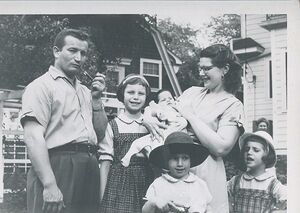Zyga Allweiss (F / Poland, 1927-2014), Holocaust survivor
Zyga Allweiss (F / Poland, 1927-2014), Holocaust survivor
- KEYWORDS : <Poland> <labor camp> <Hidden Children>
Biography
Holocaust Memorial Center
Allweiss was born in Jaslany, Poland in 1927. He had nine siblings of which only he and his brother survived. He attended public school in addition to being home-schooled. He experienced anti-Semitism as a child in the form of violent beatings on the streets. He was twelve years old when the war began and narrowly escaped the Germans by fleeing into the fields. When he returned to his house, he found it burnt to the ground. Allweiss recalls how the Germans took some Jews to Mielce and burnt them alive in the synagogue with books. Realizing the growing danger of continuing to remain in their hometown, his older siblings fled to Russia. He and his mother and four sisters remained with a neighboring Jew. They survived on a diet of bread and potatoes during 1939 and 1940.
As he spoke Polish well, Allweiss was able to pass as a gentile and found work on a farm. New rules pertaining to Jews began to emerge insisting that they must have identification. Since Allweiss was without identification he became well-versed in the art of convincing potential employers that he had been born close by. No one verified his claims, and he was able to continue working under this false identity until it became too dangerous to do so. Gradually the stipulation that all workers had to have papers became so strict that if one was caught in the streets without them, one was shot.
To avoid the risk of being shot, Allweiss and his brother voluntarily turned themselves in. They found their mother and sisters among the prisoners of the Biesiadka camp. He describes the first few months as tolerable. They were at least given food and no one was regularly beaten.
Allweiss testifies to Polish anti-Semitism and the perverse nature of the SS. He notes that Poles were awarded fifty pounds of sugar or a suit of clothes for turning a Jew into the German authorities. Furthermore, anyone found assisting a Jew suffered the consequence of having their house burned down. He tells of how the SS entertained themselves by randomly shooting prisoners. This is how he witnessed his cousin’s death. He also tells how people suffered execution for small “misdemeanors” such as boiling clothes in order to rid them of lice. Typhus was rampant in the camp and took as its victims many people over the age of forty. Allweiss’s mother fell victim to the disease and died. His brother gave her a primitive burial, and Allweiss reveals that it took him twenty years before he could bring himself to ask his brother where he had buried their mother.
Allweiss describes being plagued with envy in the camp when someone died, for they now had peace, for them it had ended. Many took their own lives because they could no longer endure the suffering. During the two years he spent in the camp he was overwhelmed by the thought that he would not survive. His experiences in the camp occupy his thoughts on a daily basis.
In 1943 the sick were rounded up and led to their deaths and burial in a mass grave. Allweiss again planned to escape. He lowered himself from a moving truck onto the road below and sought shelter in the woods. He nourished himself with stolen eggs and milk. Eventually he reached a stable where his father had told him to seek refuge in if he was in danger. There, in the dark and through the rustling hay, he was miraculously reunited with his brother and father. The three of them hid there until the arrival of the Russians. During this time, Allweiss experienced the brutality of the Polish partisans.
In the chaos of the Russian advance in 1944, Allweiss, his brother, and his father were ambushed by the SS. They fled in different directions and he learned that his father had been tortured and killed. He still does not know where his father was buried. Upon liberation, Allweiss volunteered to become a part of the Russian army. He was injured by an explosion and awoke in a hospital after the war. Although he intended to go to Israel, he came to the United States at age twenty.
